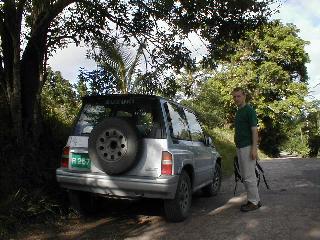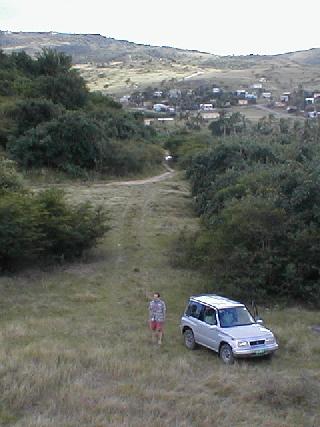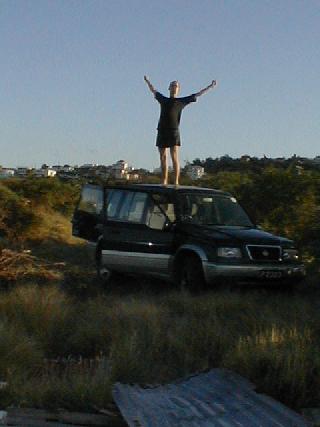
 If you're only on Antigua for a couple of days, you can get around
by taxi. You don't have to look for them - they are looking
for you. Virtually every private car doubles as a taxi, and if you look
like a tourist, the somewhat subdued "Taxi? Taxi?" will become a sound
you'll get used to like the ticking of a clock.
If you're only on Antigua for a couple of days, you can get around
by taxi. You don't have to look for them - they are looking
for you. Virtually every private car doubles as a taxi, and if you look
like a tourist, the somewhat subdued "Taxi? Taxi?" will become a sound
you'll get used to like the ticking of a clock.
(If this annoys you, you'll have to equip some object that makes you look a less likely target. A pager might work, but nothing can top the "Avis" car keys casually dangling from your hands as you walk.)
And while we're at it - never have I seen a taxi equipped with a meter or timing device; the fare you pay is always a matter of negotiation. Be sure to have at least a vague vebal agreement on the fare before you enter, and verify that you're both talking the same currency ("dollar" is not enough!).
Anyone staying for longer (and not planning to spend 90% of his time on the beach of his resort hotel) will require a rental car. Numerous companies exist at and near the airport, as well as at English Harbour in the South and in St. John's. Expect to pay about US$ 800 to 1.000 per month as a "ballpark figure"; you might strike a bargain deal somewhere but this is the average for the simple cars. The price usually includes third-party insurance. The good news is that fuel costs virtually nothing (measured by European standards at least).
If you rent a car, you will require an Antiguan driving license. You can obtain one from the rental agency if you provide a valid license from another country and EC$ 50. Such a license is valid for three months and can be extended twice; after that, you are eligible for a permanent Antiguan license which is issued based on the three temporary licenses you should have accumulated by then.
Whether a car is registered as a rental, private, business or government
vehicle can be seen from the number plate. Rental plates are green and
usually start with an "R".

The island-wide speed limit is 40 mph; 20 mph in urban areas. You will find that many people go 50-60, and, especially at night, you will also find many going 10. I believe Antigua doesn't have drink-and-drive laws - you can be drunk as a skunk for all they care as long as you don't cause an accident. That's why some people go very slow sometimes. Antigua doesn't have single track roads, so overtaking should not pose a problem. Unless of course the drunk guy in front of you chooses to drive in the middle of the road for safety reasons...
Traffic lights seem to be considered a recommendation.
Beware of cyclists. Even grown-up Antiguans often use children's bikes
and cycle with their heels on the pedals,
feet stretched outwards, lifting their knees almost up to the chin, all
the while swerving a few metres to the left or right.

I was also stopped multiple times during routine stop-and-search operations by the police and what sometimes looked like military personnel (yes, they do have an "Antiguan Defence Force"). Of course you're never happy about such an interruption because you usually are going somewhere, but the situation was never unpleasant. Every time, they would immediately explain why they stopped you (mostly they were looking for drugs and weapons - they would just create a checkpoint at a random place and look at everyone who passed), and then two or three of them would inspect your car and bags for a few minutes. They always made a point of doing everything while you were looking (actually asking you to watch them), they were always very polite, and I never felt threatened or harrassed in any way. That's more than I could say about the average U.S. American cop!
This happened about five times during my half-year stay.
The photographs on this page show myself and some colleagues with, near, and on our rental cars.